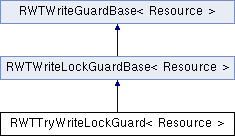SourcePro® 2021.1 |
SourcePro® API Reference Guide |
Product Documentation: SourcePro Documentation Home |
Guard class that tries to acquire write access on its resource upon creation and release it upon destruction. More...
#include <rw/sync/RWTTryWriteLockGuard.h>

Public Member Functions | |
| RWTTryWriteLockGuard (Resource &resource) | |
| ~RWTTryWriteLockGuard () | |
| bool | tryAcquire () |
 Public Member Functions inherited from RWTWriteLockGuardBase< Resource > Public Member Functions inherited from RWTWriteLockGuardBase< Resource > | |
| ~RWTWriteLockGuardBase () | |
 Public Member Functions inherited from RWTWriteGuardBase< Resource > Public Member Functions inherited from RWTWriteGuardBase< Resource > | |
| ~RWTWriteGuardBase () | |
| void | acquire () |
| bool | isAcquired () const |
| void | release () |
Private Member Functions | |
| RWTTryWriteLockGuard (const RWTTryWriteLockGuard< Resource > &second) | |
| RWTTryWriteLockGuard< Resource > & | operator= (const RWTTryWriteLockGuard< Resource > &second) |
Additional Inherited Members | |
 Protected Member Functions inherited from RWTWriteLockGuardBase< Resource > Protected Member Functions inherited from RWTWriteLockGuardBase< Resource > | |
| RWTWriteLockGuardBase (Resource &resource) | |
| RWTWriteLockGuardBase (Resource &resource, bool acquired) | |
 Protected Member Functions inherited from RWTWriteGuardBase< Resource > Protected Member Functions inherited from RWTWriteGuardBase< Resource > | |
| RWTWriteGuardBase (Resource &resource) | |
| RWTWriteGuardBase (Resource &resource, bool acquired) | |
| Resource & | resource () const |
RWTTryWriteLockGuard is a guard class that tries to acquire write access on its resource upon creation and, if successful, release it upon destruction. Guard objects work in conjunction with block statements to establish an appropriate state upon creation, maintain that state for the duration of the block, and restore the original state upon destruction. For example, a guard may acquire write access on a mutex when created and release it when destructed. The class used as the actual template parameter for Resource must be one that provides tryAcquireWrite() and release() methods, such as some synchronization classes provided in this module.
|
inline |
Constructs an instance with the given resource and attempts to acquire write access on that resource. Uses the inherited isAcquired() member function to see if the acquisition was successful.
|
inline |
Destructor.
|
private |
Copy construction prohibited.
|
private |
Assignment prohibited.
|
inline |
Tries again to acquire write access on the resource. Uses this function instead of manipulating the resource directly so the guard will automatically release it.
|
Copyright © 2021 Rogue Wave Software, Inc., a Perforce company. All Rights Reserved. |